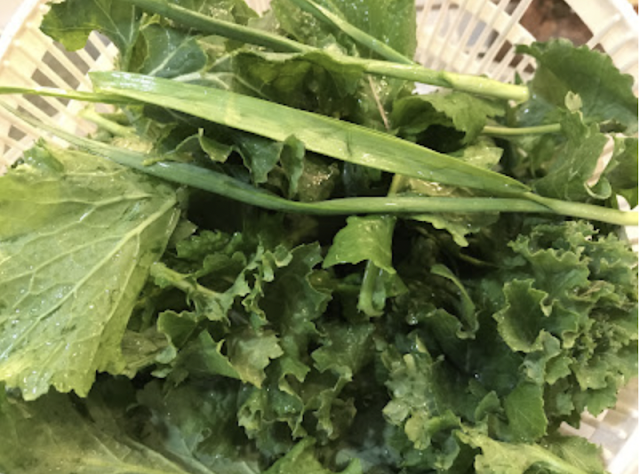The climate in my area is moderate for winters. Most years we do get a little snow that sticks around for 3 to 7 days. Our overnight low temps can dip into the teens for about a week in December or early January. This past year we had about 1 foot of snow on the ground for the better part of a week with temps not going above freezing for that entire period (lows in the low teens some nights). I'd say this was a bit colder than typical. I'm giving you this info as background for my recent experiment.
I had been curious about whether or not garden cloches would help my overwintering of greens for early spring harvests. So I decided to use homemade cloches over part of the Swiss chard but not all. I made my cloches out of plastic 1-gallon milk jugs, cutting off the bottom inch of each jug. In fall around the time of the first frost, I put these cloches on 11 Swiss chard plants. I left them on the plants all winter, removing them yesterday. Occasionally wind would blow them off, and I'd go out and put them back on. When it snowed in December and January, the snow piled up on top of each cloche. I didn't do anything to clear the snow. I left about a dozen Swiss chard plants bare for all of winter.
As I mentioned above, Tuesday I removed the cloches. 5 of the 11 plants survived the winter and are now thriving. (In the photo above, I'd just shoveled new compost around the plants and pulled out the surrounding weeds.)
In the section with uncovered Swiss chard, about 6 feet away, only 1 of 12 plants looks like it has spring growth on it. Others of these plants may put out some growth in a couple of weeks, or they may not. I'm not sure yet. However, one thing is for certain, the cloches brought about new healthy growth much earlier in the overwintered Swiss chard. I'd say this experiment was fruitful for me in coming winters. Our kale and turnips overwinter without covering, but the Swiss chard has always been hit or miss.
Why do I like to do these experiments? I think I'm always looking for ways to improve in my work. With gardening, that means harvesting even more or for more weeks of the year. If we ever truly need to rely heavily on our garden, it's nice to know that we can get more Swiss chard when not a whole lot else is producing. The bonus is the milk jugs didn't cost me anything and have now been set aside to reuse next winter. I may try this next year to see if I can get the kale or turnip greens to start spring growth even earlier in the season. Anyways, my little free experiment.






